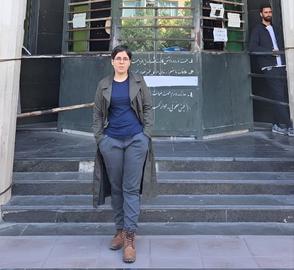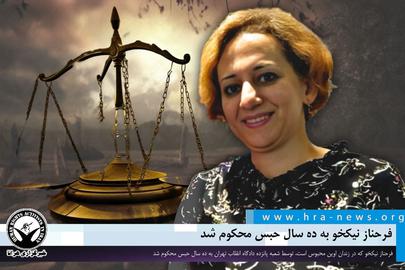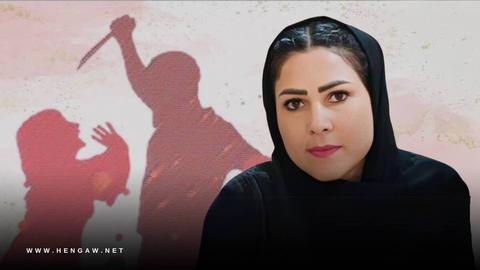Feminism is the predominant theme in stories told by Tahmineh Milani, the highly regarded Iranian film director and producer, screenwriter, architect and painter.
Whether about a female student who is in an unhealthy relationship, a mother fighting a powerful father-in-law over the custody of her children, a woman dealing with a philanderer husband or women seeking revenge against hurtful men, women in her films are agents of good, even in the most horrific of situations.
Milani has also made comedies and movies with a philosophical undertone, although women tend to be at the heart of these too. This is what angers Iranian hardliners, her most vocal critics, who accuse her of bias. In the early days of the 1979 Islamic Revolution, she was under the influence of leftist politics, which is what the hardline press refers to every time they want to attack or discredit her. The newspaper Keyhan, published under the supervision of the office of the Islamic Republic’s supreme leader, called her an “unprincipled” director, while Fars news agency, affiliated with the Islamic Revolutionary Guard Corps (IRGC), ridiculed state television for inviting her to appear on a TV program.
The authorities have censored Milani on a number of occasions and several of her films have been banned. Likewise, her scripts have been rejected or have received permits after considerable difficulty and changes. Despite these obstacles, she has won numerous awards from international festivals and audiences.
Born in 1960 in Tabriz, the capital of East Azarbaijan province, Milani first began studying electrical engineering at the University of Tabriz soon after the 1979 Islamic Revolution. However, when the new regime started closing universities to make them more “Islamic,” she moved to Tehran and changed to architecture.
She loved literature and films, and rarely missed an opportunity to attend a literary or cultural gathering at the University of Sciences and Technology where she was studying. It was through these gatherings that she came to know successful Iranian director Masoud Kimiai who hired her in 1982 as assistant director for his film “The Red Line.” She was just 22 years old.
Taking this chance seriously, Milani quickly impressed those around her and rose up in the ranks. As a keen reader, especially regarding social issues, she completed enormous research on scripts and before long she was writing her own. Then in 1989, when she was just 29 years old, she directed her first film, “Children of Divorce.” It was awarded the Best Movie by the Fajr Film Festival, Iran’s biggest film festival.
Then in 1991, she made her second film, “The Legend of Sigh,” a “philosophical” movie based on the mythology of Azerbaijan which explores the hardships and strengths of women in Iran. The movie was a box office failure. A year later she directed the comedy “What Else Is New?” about an imaginative and lively student who transforms her immediate family and surroundings when she talks herself into writing a novel. The movie was a success.
“If The Legend of Sigh had been successful at the box office, it’s possible I would have stuck with the same genre and never have tried anything else,” Milani said in an interview with the newspaper Etemad.
Then in 1997, when the reformist Mohammad Khatami was president, she made “Two Women,” the first film in a trilogy about women. It received the Best Script award at the Fajr Film Festival.
The second in the trilogy, which came out in 2001, was “The Hidden Half.” It tells the story of a young female student who joined a Marxist group during the 1979 revolution but who is forced to hide her past when she gets married and then, eventually, to reveal it.
The Arrest
When the film was screened, the authorities arrested Milani and detained her at Tehran’s Evin Prison. She was not told what charges she was facing, but it was said that she was accused of “activities against national security,” “abusing the arts as a tool for counter-revolutionary activities,” “supporting counter-revolutionary groups” and “waging war against God,” the last of which can carry a death sentence.
“My husband had taken my young daughter Gina to his work and I was alone in our home when suddenly five men arrived and told me that they had a letter for me about my film,” she said in a 2006 interview. “My husband came home but they searched everything in my house and took a lot of things—my scripts, books, videos and other material. Many things were broken. All of this happened without warning and then they took me to prison, and my husband was not able to locate where I was for three days.
“I had no lawyer and the jailers kept saying that the authorities would kill me. Every day I was questioned for many hours and didn’t sleep for seven days. Look at me, I have big eyes, but after seven days you could barely see my eyes; the lids were so closed up.”
After two weeks in prison and following protests by directors such as Francis Ford Coppola and Martin Scorsese, Khatami intervened and Supreme Leader Ali Khamenei ordered her release. The charges, however, have never been dropped.
Milani incorporated the stories of some of her cellmates into her 2007 film “Settling Scores.” The story is about a group of women who are released from prison, rent a house and set out to get revenge on the men around them. By pretending to be prostitutes, they lure men into the house, beat and steal their valuables and then kick them out. It took Milani two years to get the permit to make and distribute this film and yet, when it was released, many Iranian critics said it was one of her worst works and criticized it for being “extremely feminist.”
In 2003, Milani received the Grand Prix from the Geneva International Film Festival for “The Fifth Reaction.” Then in 2005, her film “The Unwanted Woman” was selected as the Best Picture at the Los Angeles Film Festival.
In 2014, Milani was invited to a live TV broadcast in Iran to discuss her film, “Ceasefire,” and enraged hardline media with comments she made during the interview. They claimed she had insulted the Iranian people because she rejected their claim that international film awards were “enemy awards.”
“Why do you think the festivals take advantage of us?” Milani said. “I totally reject this. Don’t they have anything better to do than take advantage of us? Why are we making so many enemies?”
The same year — not long after the Ministry of Islamic Culture and Guidance had approved the script for “Scheherazade, The Woman of One Thousand and One Nights” — she was summoned to the Culture and Media Court to answer questions.
Tahmineh Milani is very prolific but only a part of her works have been released to the public because many of them have been banned by the Islamic Republic’s censors.
“Most of my films were banned from seven months to four years” and two were banned forever, she says. “A number of my scripts were denied permission to produce. That is why I turned to painting.”
She faced the wrath of her critics once again. Her first painting exhibition was called “The Movies That I Did Not Make” and named the following ones after films she had not been allowed to produce. Besides painting, she also does photography and, so far, has had one exhibition of her works. She says that although her exhibitions were received incredibly well, “pressure groups and security agencies attacked me forcefully, aiming at assassinating my character.”
Tahmineh Milani, her husband Mohammad Nikbeen and their daughter Gina are also architects. Alongside filmmaking, Milani and Nikbeen are equal partners in the running of an architectural firm. Nikbeen has produced several of Milani’s movies and acted in two of them.
visit the accountability section
In this section of Iran Wire, you can contact the officials and launch your campaign for various problems


























comments